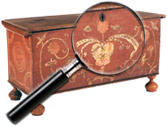David Dixon Porter, Admiral USN (1813-1891)
Born at Chester, Pennsylvania, June 8, 1813, the son of David and Evelina Anderson Porter. David Dixon Porter married Georgie Ann Patterson, March 10, 1839 and they had ten children, including Lieutenant Colonel Carlile Patterson Porter.
He was commissioned Lieutenant, U.S. Navy, 1841, and commanded a landing party of 70 seamen and captured Fort Tabasco, Mexico, in 1847; he commanded the steamer Panama, 1849, and made a voyage through the Straits of Magellan to the Pacific; commanded the privately owned mail steamer Georgia, 1850-52; made regular trips from New York City to Havana; Captain of the ship Golden Age between Melbourne and Sydney for the Australian Steamship Company, 1852-55.
Porter served as a First Lieutenant, U.S. Navy, at the Portsmouth Navy Yard from 1857 to 1860 and took a prominent part in the preliminary planning of the New Orleans expedition; in command of a mortar flotilla under Admiral Farragut, New Orleans, and on the Mississippi River, 1862. He commanded the fleets below Forts St. Phillip and Jackson, and demanded and accepted their surrender on favorable terms in 1862. Porter served as Acting Rear Admiral, Commander, Mississippi River Squadron in 1862, in which capacity he aided in the assault on and the capture of Arkansas Post. Porter cooperated with General U.S. Grant in the assault on Vicksburg in 1863 and was commisioned Rear Admiral the same year. He took charge of the lower Mississippi River as far South as New Orleans; commanded naval forces cooperating with the Army in the Red River Expedition, 1864; commanded naval forces attacking Fort Fisher, 1864-65. General Terry Porter captured the defenses of Wilmington, North Carolina; commanded the North Atlantic Blockading Squadron, 1864.
After the war Porter served as Superintendent of the United States Naval Academy from 1865 to 1869 where he improved the curriculum and instructional methods. He conducted unsuccessful diplomatic negotiations in Santo Domingo to secure cession or lease of Samana Bay, 1866-67; and was appointed adviser to the Secretary of the Navy by President Grant, 1869-70. Porter instituted a reform policy, organized boards to inspect the fleets and navy yards, began to repair many vessels and was promted to Full Admiral, 1870.
Porter died at Washington, D.C. on February 13, 1891 and is buried in Arlington National Cemetery, not far from his grandson, Major General David Dixon Porter and his great-granddaughter, Carlie Patterson Porter.
